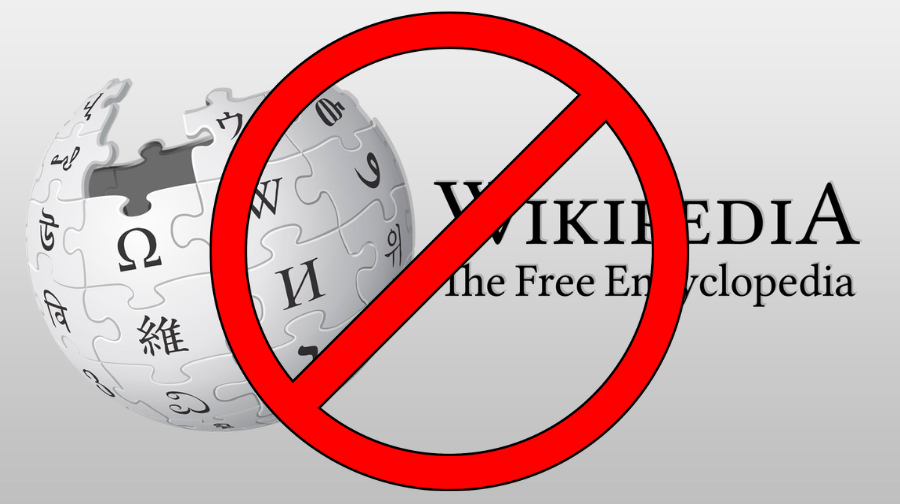
Remix of Wikipedia Logo by Rezwan. Used with permission. CC BY-SA 4.0 | Pixabay License
On February 5, 2023, Pakistan imposed a ban on Wikipedia due to its alleged failure to remove blasphemous content. This is not the first time social media platforms have been banned in the country, and, although access to Wikipedia was restored on February 7, the broad censorship powers of the government are a cause for concern.
In the past, the Pakistan Telecommunication Authority (PTA) has briefly banned major social media platforms such as Facebook, TikTok, and YouTube, for hosting content considered blasphemous, a contentious matter in Pakistan where the majority of the population is Muslim. Although the Constitution of Pakistan guarantees the right to freedom of speech and expression, this right has been restricted in practice by various regulations, policies, and actions.
Prime Minister Shahbaz Sharif announced a committee to investigate the incident and suggest alternative technical methods for removing or restricting access to objectionable content posted on sites such as Wikipedia. This action was taken in consideration of social, cultural, and religious sensitivities in Pakistan.
Islamabad-based veteran Journalist Rauf Klasra criticized the current prime minister and tweeted:
Sir @CMShehbaz its mind boggling as how can any country leave alone Pakistan ban #Wikipedia?Pls ask #PTA to remove ban.We visit it read for knowledge&information not to read objectionable stuff.Such laughable tricks in this age are mere a joke.Don’t reverse age of information pls pic.twitter.com/b82Ht40Uuv
— Rauf Klasra (@KlasraRauf) February 4, 2023
Amnesty International South Asia released a statement on the Wikipedia ban:
PAKISTAN: We are alarmed about the blanket #Wikipediablock implemented by the Pakistan Telecommunication Authority (PTA) on 4 Feb. This amounts to an unjustifiable restriction on the right to freedom of expression and must be reversed immediately and unconditionally. (1/3)
— Amnesty International South Asia (@amnestysasia) February 6, 2023
Laws that facilitate censorship
Internet censorship in Pakistan has been a topic of controversy and debate for many years. The Pakistani government has enforced several restrictions on accessing certain websites and online material, often citing reasons such as national security, blasphemy laws, and moral principles.
Nighat Dad, a lawyer, and a digital rights activist tweeted:
Do you know #Pakistan has 55 million views of #Wikipedia per month. How few people can decide on behalf of millions to blanket ban an entire platform? #wikipediaBlocked https://t.co/FuzuUHZnrv
— Nighat Dad (@nighatdad) February 4, 2023
The PTA is one of the primary drivers for implementing internet censorship in Pakistan. Its role involves scrutinizing and banning websites considered inappropriate for the Pakistani audience. The PTA has the authority to instruct internet service providers (ISPs) to block access to particular sites, and it maintains a blacklist of sites that are deemed to be inappropriate.
Pakistan has several laws, including the Pakistan Electronic Crimes Act (PECA) 2016 and blasphemy laws, that limit freedom of expression. These laws/regulations have been utilized to suppress online content and target individuals who express dissenting views, such as journalists and activists. Moreover, media outlets encounter pressure from the authorities and influential entities, leading to self-censorship and restrictions on reporting.
In 2021, Pakistan introduced the Removal and Blocking of Unlawful Content (Procedure, Oversight, and Safeguard) Rules, which require social media companies to remove any content deemed to be unlawful by the government within 24 hours of receiving a request.
Blasphemy laws in Pakistan
Blasphemy is an extremely delicate matter in the Muslim-majority South Asian nation, and it carries the death penalty under Pakistani laws.
Pakistan's blasphemy law originated from the British colonial era and was kept on after the partition of India and the independence of Pakistan in 1947. The punishments prescribed under these laws ranged from one to 10 years of imprisonment, either with or without a fine. During the military rule of General Zia-ul Haq between 1980 and 1986, several clauses were introduced, making the law more severe. The law has been amended multiple times since then, with the latest revision in January 2023, making it even more punitive. Currently, individuals who disrespect Islam, the Prophet Mohammed, or even his companions, can be sentenced to life imprisonment or face the death penalty. Furthermore, the charges laid under this law are non-bailable. This made the law prone to abuse.
Religious minorities in Pakistan, notably Christians, Ahmadis, and Hindus, have been the victims of the misuse of blasphemy laws. These communities are frequently charged with blasphemy based on unfounded accusations or without proof. Not only have Pakistan's blasphemy laws been used to victimize minority groups, but they have also been deployed to settle personal scores, frequently against Muslim minority sects. According to a report by the Centre for Research and Security Studies (CRSS), between 1947 and 2021, 95 people were killed by mobs or in other extra-judicial forms after being accused of blasphemy. In the past three decades over 1,500 people have been charged with blasphemy.
Senator Mustafa Nawaz Khokhar of the Pakistan People's Party expressed his disappointment, stating that weaponizing blasphemy was a new low for politics in Pakistan and becoming a dangerous trend.
While talking to AFP, Usama Khilji, director of civil society organization Bolo Bhi said the Wikipedia ban is “disproportionate, unconstitutional, and quite ridiculous” and will impact especially students, academia, the healthcare sector, and researchers.








1 comment
Rightly explained the incident and the exercise of the freedom of speech in Pakistan. Well done.